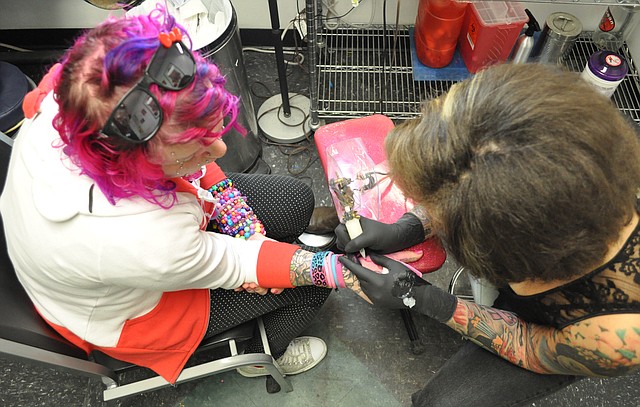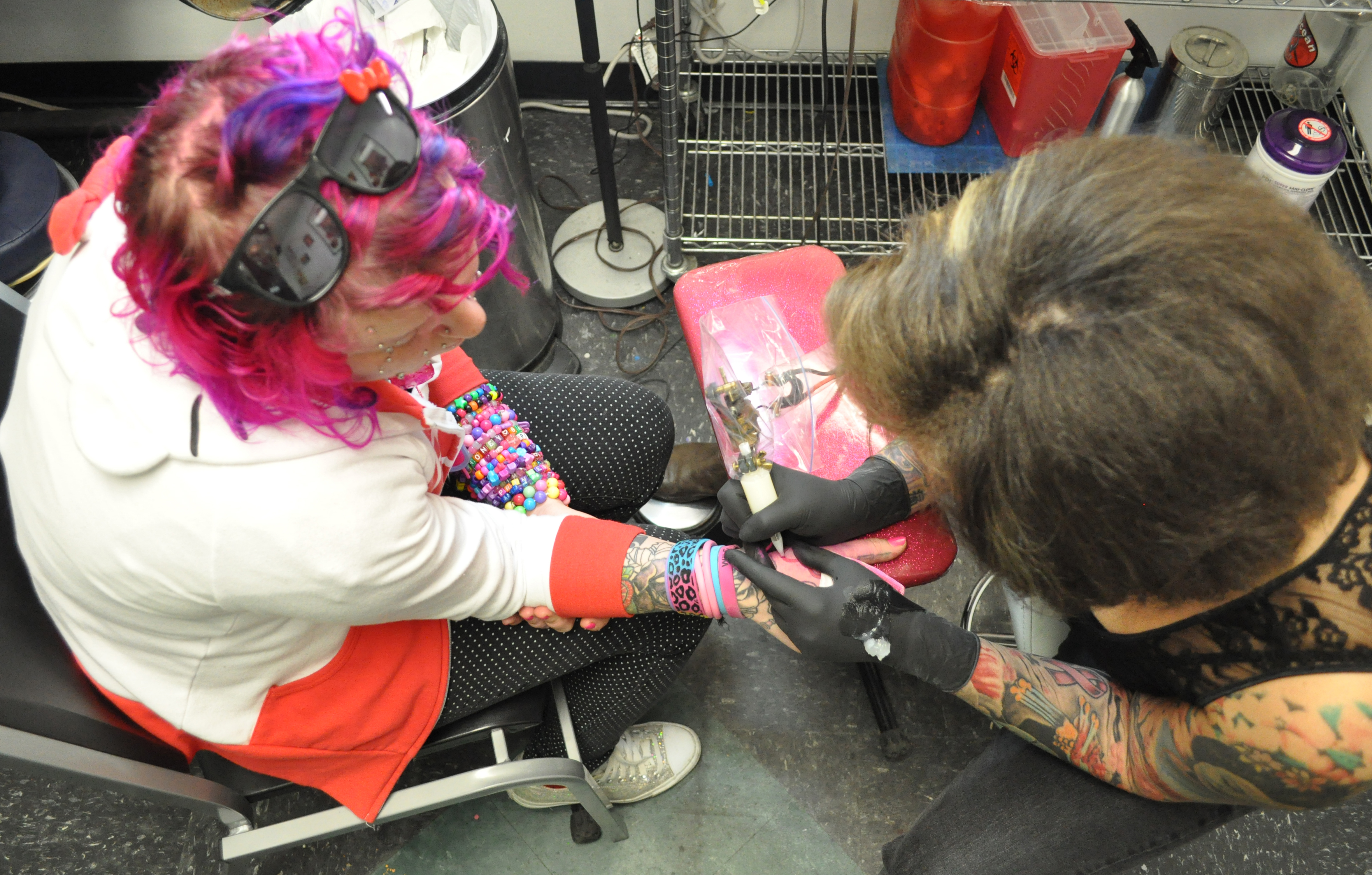Chattanooga area tattoo artists decry 'scratchers'
Monday, March 5, 2012
WHAT TO KNOWThings to look for before getting a tattoo, required under Tennessee law:• Posted license of the artist and facility• An autoclave, or steam sterilizer• Neat and clean establishment• No live animals in the establishment, except for fish in aquariums• No food or drinks in the operation area• Gloves should be worn at all times by tattoo artistPENALTIES UNDER TENNESSEE LAW• Tattooing without a license: Class C misdemeanor, punishable by up to 30 days in jail and a $50 fine.• Tattooing someone under 18: Class A misdemeanor, punishable by up to 11 months and 29 days.
Tattoo artists cringe when they see the posted pictures on Facebook - someone holding a piece of pizza in one hand and tattooing someone with the other; or tattoos being inked at a kitchen table with a pet nearby; or young teenagers displaying a recent tattoo.
The quick tattoo in your best friend's kitchen or an alley apartment may be cheaper and faster, but licensed artists say the long-term costs can be devastating. They frequently see transmitted diseases, infected tattoos, badly scarred skin and kids who regret immature decisions.
Licensed tattoo artists call the unlicensed artists "scratchers" or "kitchen magicians."
"You can't just pick up a machine and start inking. Scratchers don't understand that, have no concept of what art is," said Brandy Burgans, who tattoos at Standard Ink on the North Shore.
The illegal businesses are increasing in the Chattanooga area, local tattoo artists say, fueled by TV shows such as "LA Ink" and "NY Ink" and the ease of advertising tattoo services on social media sites.
"We've seen an influx in clients coming in with very poorly done tattoos, scarred work," said Burgans.
In an effort to combat the problem, licensed tattoo artists have formed the Chattanooga Guild for Professional Tattoo Artists. Guild leaders say they want to start an education campaign to increase public awareness of the problem. In the future, they say they may push to tighten state laws or advocate for local ordinances to target unlicensed operators.
"People need to know that they should ask to see someone's license, that they should know who these people are," said Lala Hartline, co-owner at Evermore Galleries. "Especially being a mother, it is a huge, huge concern for me."
Tracking how many unlicensed artists operate in the Chattanooga area is difficult, said Bonnie Deakins, director of environmental health services at the Chattanooga-Hamilton County Health Department.
If the department has specific information about an unlicensed artist, such as a name or address, they can take action to shut down the operation, Deakins said. Unfortunately, the information they usually get is vague and based on rumors, leaving them with little to work with, she said.
TATTOO REGULATIONS
Tennessee state law governs tattoo artists and their businesses, and local health departments inspect the operations.
To get a license, artists are required to do one year of apprenticeship under an experienced artist and renew their licenses each year. A tattoo shop also must have a license and undergo inspections four times a year.
All tattooing equipment and needles must be sterilized and work must be done under certain sterile conditions. Artists must also receive training in sterilization techniques.
In Georgia, district public health departments regulate and inspect body art businesses.
Tim Allee, environmental health district director for Northwest Georgia Public Health which includes, Dade, Catoosa, Walker and Chattooga counties, said the district implemented tattoo regulations in January 2010. The regulations require a license, inspections and sterilized equipment, he said.
"We don't mind the laws; they are a good thing," said Justin Nave, owner of Sick Boys Ink, which has shops in Chattanooga and Dunlap, Tenn. "We want to be a productive part of the community, but scratchers compromise and undermine the progress tattoo artists have made."
At issue is the fact that there are few consequences for operating without a license, Chattanooga artists say. The health department does all it can to monitor and shut down operations, but the penalties don't have a lot of teeth.
Tattooing children under 18 is a class A misdemeanor, punishable by up to 11 months and 29 days in jail and $2,500 fine. Operating without a license has a significantly lesser penalty of up to 30 days in jail and a $50 fine.
A bill under consideration in the Tennessee Legislature would tighten laws for tattooing someone under 18, requiring that teachers or other authority figures report tattoos to law enforcement or an entity such as the health department.
Deakins and Allee both said they believe the laws in place now in Georgia and Tennessee are adequate to deal with unlicensed artists.
If they do identify someone tattooing without a license, the health department sends a letter telling them to halt the operation, Deakins said. If the person continues to tattoo, the information is given to the local district attorney's office.
AN EVOLVING ART
Chattanooga artists say that, in the last 10 years, the popularity of TV shows featuring tattoos artists have helped to dispel some myths about the industry. But those same shows also have attracted people who decide they want to tattoo without taking the proper training or getting a license.
Burgans, 33, has been an artist for four years. She demonstrates how every needle and every piece of equipment is sterilized before she begins work.
Tattoo artists are dedicated to safety and take their work seriously, she said. If they don't think a particular tattoo is a good idea, they don't hesitate to tell the client.
"We are more like therapists," she said. "This is a sacred art to us."

